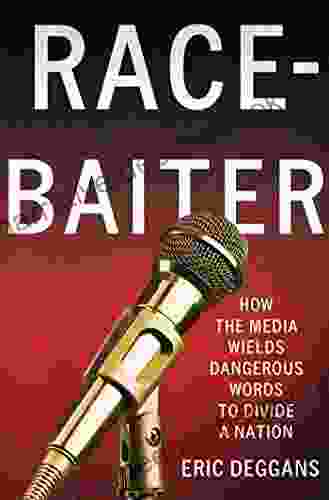How to Win the Debates That Matter

In today's world, being able to debate effectively is more important than ever. Whether you're trying to win an argument with a friend, persuade your boss to give you a raise, or make a point in a public forum, the ability to articulate your thoughts clearly and persuasively can give you a significant advantage.
But debating isn't always easy. If you're not careful, you can quickly get sidetracked by emotions, fallacies, and other obstacles. That's why it's important to learn the basic principles of debate and how to use them effectively.
In this article, we'll provide you with a comprehensive guide to winning the debates that matter. We'll cover everything from identifying the key issues to using persuasive techniques and avoiding logical fallacies. By the end of this article, you'll have the tools and strategies you need to build a strong argument and present it with confidence and impact.
4.5 out of 5
| Language | : | English |
| File size | : | 2703 KB |
| Text-to-Speech | : | Enabled |
| Screen Reader | : | Supported |
| Enhanced typesetting | : | Enabled |
| Word Wise | : | Enabled |
| Print length | : | 207 pages |
| Lending | : | Enabled |
The first step to winning a debate is to identify the key issues. What are the main points that you need to argue in order to make your case? Once you know what the key issues are, you can start to develop your arguments around them.
It's important to be clear and concise when identifying the key issues. Don't try to cover too much ground, or you'll lose focus and your audience will get confused. Instead, focus on the most important points that you need to make.
Here are some tips for identifying the key issues:
- Start by brainstorming. What are the main points that you want to make? What are the different sides of the issue?
- Look for common ground. Are there any areas where you and your opponent agree? If so, these can be helpful starting points for your debate.
- Prioritize your issues. Once you have a list of potential key issues, prioritize them in order of importance. Which issues are most important to your case?
Once you have identified the key issues, you need to develop your arguments. This is where you will present your evidence and reasoning to support your position.
There are many different ways to develop an argument. Some common methods include:
- Deductive reasoning: This type of argument starts with a general statement and then provides evidence to support it. For example, you could argue that "all men are mortal" and then provide evidence such as "Socrates was a man" and "Socrates is dead."
- Inductive reasoning: This type of argument starts with a specific observation and then generalizes from it. For example, you could argue that "my friend is a good person" and then generalize to "all people are good."
- Analogical reasoning: This type of argument compares two things that are similar in order to make a point. For example, you could argue that "the human body is like a car" and then use this analogy to explain how the body works.
When developing your arguments, it's important to be clear, concise, and persuasive. Avoid using jargon or technical language that your audience may not understand. And be sure to provide evidence to support your claims.
In addition to developing strong arguments, you can also use persuasive techniques to help you win debates. These techniques can help you to connect with your audience, build rapport, and make your arguments more convincing.
Some common persuasive techniques include:
- Ethos: This is the use of your credibility and expertise to persuade your audience. When you use ethos, you are essentially saying, "I know what I'm talking about, so you should believe me."
- Pathos: This is the use of emotions to persuade your audience. When you use pathos, you are trying to make your audience feel something, such as anger, fear, or pity.
- Logos: This is the use of logic and reason to persuade your audience. When you use logos, you are presenting your audience with facts, evidence, and arguments to support your position.
It's important to use persuasive techniques in moderation. If you rely too heavily on ethos, you may come across as arrogant or self-serving. If you use too much pathos, you may come across as manipulative or emotional. And if you use too much logos, you may come across as boring or dry.
The key is to find a balance between these three persuasive techniques. By using ethos, pathos, and logos in the right way, you can increase your chances of winning debates.
Logical fallacies are errors in reasoning that can weaken your arguments and make you look foolish. There are many different types of logical fallacies, but some of the most common include:
- Ad hominem: This fallacy attacks the person making the argument rather than the argument itself. For example, you might say that your opponent is "stupid" or "uninformed" instead of addressing the merits of their argument.
- Straw man: This fallacy misrepresents your opponent's argument in order to make it easier to attack. For example, you might say that your opponent is arguing for "anarchy" when they are actually arguing for a limited government.
- Red herring: This fallacy introduces a new and irrelevant topic into the debate in order to distract from the main issue. For example, you might bring up your opponent's personal life or past mistakes instead of focusing on the issue at hand.
Logical fallacies
4.5 out of 5
| Language | : | English |
| File size | : | 2703 KB |
| Text-to-Speech | : | Enabled |
| Screen Reader | : | Supported |
| Enhanced typesetting | : | Enabled |
| Word Wise | : | Enabled |
| Print length | : | 207 pages |
| Lending | : | Enabled |
Do you want to contribute by writing guest posts on this blog?
Please contact us and send us a resume of previous articles that you have written.
 Book
Book Novel
Novel Page
Page Chapter
Chapter Story
Story Paperback
Paperback Magazine
Magazine Newspaper
Newspaper Paragraph
Paragraph Sentence
Sentence Shelf
Shelf Glossary
Glossary Preface
Preface Annotation
Annotation Footnote
Footnote Manuscript
Manuscript Scroll
Scroll Bestseller
Bestseller Classics
Classics Autobiography
Autobiography Memoir
Memoir Reference
Reference Encyclopedia
Encyclopedia Dictionary
Dictionary Thesaurus
Thesaurus Resolution
Resolution Librarian
Librarian Card Catalog
Card Catalog Borrowing
Borrowing Stacks
Stacks Archives
Archives Research
Research Scholarly
Scholarly Lending
Lending Reading Room
Reading Room Thesis
Thesis Dissertation
Dissertation Awards
Awards Book Club
Book Club Theory
Theory Lauren Lashley
Lauren Lashley Christine Lohmeier
Christine Lohmeier Matthew Hoch
Matthew Hoch Sarina Bowen
Sarina Bowen Michael Checchio
Michael Checchio Jessica K Quillin
Jessica K Quillin Cute Amigurumi
Cute Amigurumi James Bender
James Bender Auberon Herbert
Auberon Herbert David Lindsley
David Lindsley Donna M Orange
Donna M Orange Kerry Kletter
Kerry Kletter Georg Fischer
Georg Fischer Laura England
Laura England Christopher F Small
Christopher F Small Gilly Salmon
Gilly Salmon G Alan Tarr
G Alan Tarr Michael Hayden
Michael Hayden E Paul Zehr
E Paul Zehr Jane Kirkpatrick
Jane Kirkpatrick
Light bulbAdvertise smarter! Our strategic ad space ensures maximum exposure. Reserve your spot today!
 Stan WardFollow ·19.2k
Stan WardFollow ·19.2k Spencer PowellFollow ·5.1k
Spencer PowellFollow ·5.1k Max TurnerFollow ·12.7k
Max TurnerFollow ·12.7k Gage HayesFollow ·8k
Gage HayesFollow ·8k Michael SimmonsFollow ·5.7k
Michael SimmonsFollow ·5.7k George R.R. MartinFollow ·7.4k
George R.R. MartinFollow ·7.4k Dan BellFollow ·5.5k
Dan BellFollow ·5.5k Evan SimmonsFollow ·2.3k
Evan SimmonsFollow ·2.3k

 Dallas Turner
Dallas TurnerParasols and Peril: Adventures in Grace
In the quaint town...

 Caleb Carter
Caleb CarterFlight Attendant Joe: A Dedicated Professional in the...
Flight Attendant Joe...

 Jerry Ward
Jerry WardPick Lottery The List For 23 States August 15 2024
The Pick Lottery is a multi-state lottery...

 Hudson Hayes
Hudson HayesHow the Media Wields Dangerous Words to Divide a Nation
In a world where the media is...

 Curtis Stewart
Curtis StewartThe Magic Mala: A Story That Changes Lives
In the realm of ancient traditions and...

 Raymond Parker
Raymond ParkerEarthly Meditations: A Poetic Tapestry of Nature,...
In the realm of contemporary...
4.5 out of 5
| Language | : | English |
| File size | : | 2703 KB |
| Text-to-Speech | : | Enabled |
| Screen Reader | : | Supported |
| Enhanced typesetting | : | Enabled |
| Word Wise | : | Enabled |
| Print length | : | 207 pages |
| Lending | : | Enabled |












